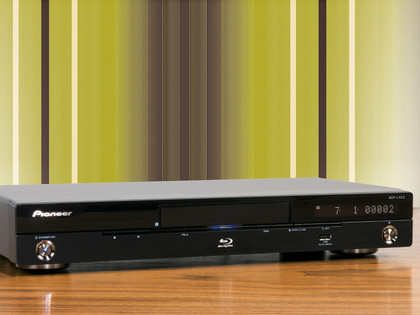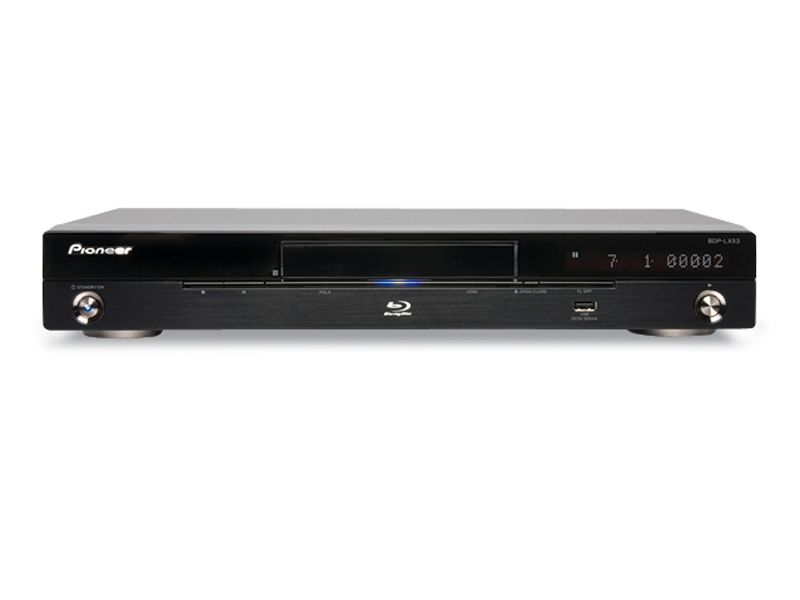TechRadar Verdict
Pros
- +
Vivid colours and dense detail with Blu-ray
- +
Good upscaling
- +
Great iPhone app available
Cons
- -
No 3D or universal playback
- -
Slow disc mechanism
- -
Poor online offering
- -
Basic operating system
Why you can trust TechRadar
Pioneer's pricey BDP-LX53 Blu-ray player offers none of the niceties that brands use to lure us to the next price point. Instead of 3D, Wi-Fi, universal playback or even a set of multichannel outputs, this step-up player trades purely on performance.
It's a high-risk strategy, given the impressive quality of this year's budget offerings. Lucky then, that the picture quality is spanking.
It's the first deck we've reviewed for a while where the list of things it can't do actually eclipses the feature set. However, it is also the first to offer its own iPhone application.
iControlAV is a free download from the iTunes Store and it works a treat, giving you convenient touchscreen access to even the more complex menu settings.
In other respects, this machine is a regular player of plastic construction, but of a reasonably high standard with crisp styling. Pioneer's dual layer chassis and rubber feet provide the disc mechanism with a good stable platform.
There's a USB port at the front and another at the back along with minimal connections. At this price it's unusual not to see the Super Audio CD and DVD-Audio logos along with a full set of multichannel outputs. The two formats are all but extinct, but it's still a blow for anyone with a back catalogue.
It's also a surprising move from the brand that was among the first to market a universal player and is touting this as an audiophile machine. At least the high-resolution movie formats, Dolby TrueHD and DTS-HD Master Audio, are present and correct.
Sign up for breaking news, reviews, opinion, top tech deals, and more.
The A to B of web apps
Pioneer has introduced two web applications with this player in the shape of YouTube and an RSS feed. The former adds some amusing clips, but it's slow to open and, frankly, it just highlights how slow the manufacturer is to match rivals with its online offerings.
Finally we come to Blu-ray, which is this deck's raison d'etre and the news is nearly all good performancewise. However, you will need to exercise some patience before operating this deck, as it takes an age to load and play a Blu-ray, and the noisy mechanism makes a meal of navigating through the chapters.
The stubborn operating system insists that you close the disc drawer before pressing play and that you press stop during playback, sometimes twice, before you are allowed to go to the home page.
The main menu page is an improvement on last year's models, but still rudimentary compared with other brands. What does inspire confidence in the picture quality is the jet black splash screen and razor-sharp Pioneer logo.
Sure enough, when you play a Blu-ray and output a 1080p signal at 24fps into a screen , it's hard not to be impressed by the glossy, vivid colours and eye-popping detail.
Where the budget machines struggle to show consistently sharp lines of delineation during motion sequences, the Pioneer holds them together with ease, maintaining straight and even edges throughout.
It also has the bold, consistent colours and dark black levels of a premium player. It is x.v.Colour compliant as well as offering 36-bit Deep Colour processing for similarly specified displays. Look at any blue sky scene and there's virtually no fizz or grain to spoil the view.
Using 2012 as a test Blu-ray disc, we were best able to appreciate the level of detail on offer in the supermarket scene in Chapter six. Looking over the shoulders of the actors, we could read not just the brand names of all the products on the shelves, but the prices, too. So we have to assume that Huggies and Kelloggs did pay for their product placements!
During the ensuing earthquake chase scene, we were equally as impressed with the lack of any breakup in the image. DVDs also benefit from the smooth imagery with some very convincing video upscaling. In short, your standard-def DVDs will look significantly less mushy on this machine than on a budget rival.
Sound sensation
Pioneer Blu-ray players usually sound rather good, too, and this one comes with gold-plated connectors, including the HDMi port, an upgraded power supply and Precision Quartz Lock System (PQLS).
The latter only comes into play if you are using a Pioneer amp. It effectively reduces audio jitter to almost zero, thereby enhancing the sound, and providing a compelling reason for having all Pioneer kit, if you already own one of the brand's excellent receivers.

With a regular amp, in this case a Denon AVR-4810, it sounded clear and open enough through both the analogue outputs and the HDMI output. High-resolution movie soundtracks sound particularly dynamic.
Many Blu-ray players these days fancy themselves as multimedia hubs offering web content, data streaming and USB interfacing. Pioneer has scaled down its media sharing claims and rightly so. Yes, it can read MP3s and JPEGs from an external drive, but not very well. It skipped a few songs and crashed on a photo when I tried it. But then just plugging the drive straight into an amp or TV is a better option anyway.
The LX53 is a perplexing player. it's the brand's flagship, but it lacks the premium build quality of an audiophile deck and the extra features we would expect from a step-up deck. Near perfect picture quality is its trump card, and for a Blu-ray player, that's a very strong card to play.
Follow TechRadar Reviews on Twitter: http://twitter.com/techradarreview

Jim has been evaluating printers for more than twenty years and has, to date, written over a hundred reviews for TechRadar Pro. From pocket printers to industrial dye sublimation, Jim has been there, run the tests and printed the t-shirt. His expertise extends to consumables (paper, ink, toner) and his printer buying guides make it easy to compare these essential peripherals.
